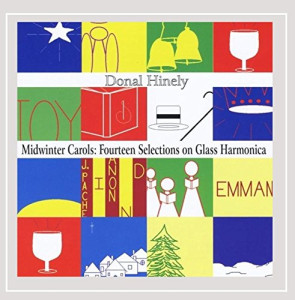 Every passing year brings more and more Christmas and holiday music to music racks across the country. New recordings, reissues, compilations are on shelves from the local indy music store to the biggest of the big box outlets — there’s a veritable glut of seasonal song available, but is any of it worth a listen? Some yes, some no. Okay, but is any of the worthwhile stuff really interesting? Ah, that’s different, isn’t it? Donal Hinely‘s Midwinter Carols certainly fits the bill, but then again, it’s not one you’re likely to run across at your local Wal-Mart.
Every passing year brings more and more Christmas and holiday music to music racks across the country. New recordings, reissues, compilations are on shelves from the local indy music store to the biggest of the big box outlets — there’s a veritable glut of seasonal song available, but is any of it worth a listen? Some yes, some no. Okay, but is any of the worthwhile stuff really interesting? Ah, that’s different, isn’t it? Donal Hinely‘s Midwinter Carols certainly fits the bill, but then again, it’s not one you’re likely to run across at your local Wal-Mart.
The glass harmonica is an instrument steeped in mystery and lore. Beethoven and Mozart both wrote music specifically for its ethereal tones, and Ben Franklin devised an elegant variation of the instrument by nesting crystal bowls along a central axis. Hinely doesn’t boast so grand a setup, however, as he performs all his music the old fashioned way – by running his fingers along the rim of crystal stemware filled with varying amounts of water. He was first exposed to the instrument through his brother, Terry, with whom he formed the duo Glasnots. After his brother’s untimely death, Hinely concentrated on learning to play the glass harmonica (he’d played guitar accompaniment previously), and judging by the 14 instrumental tracks on Midwinter Carols, it’s time that was well spent.
The disc opens with “Silent Night,” an appropriately haunting and eerie piece that is perfectly suited as a showcase for the glass harmonica. Just listening to it evokes impressions of flickering candles, midnight mass and foggy breath. “Silent Night” is low-hanging fruit, so to speak — the music was written to sound good without musical accompaniment and its solemn grace is probably as close to foolproof as possible. “O Come, O Come Emmanuel” and “O Little Town of Bethlehem” continue in this vein. The former, supported by sparse acoustic guitar, is stripped down and melancholy. The latter, if anything, is even more subdued, with a gentle, understated guitar joining in on the second verse to give just the right amount of contrast to the glass harmonica. Likewise, “In the Bleak Midwinter,” a tune I’d not had the pleasure of hearing before, is simply beautiful with Hinely’s arrangements conjuring scenes of snow-covered forests and flame-licked logs in a fireplace — and that, among other things, is what good seasonal music does, right?
“Coventry Carol,” on the other hand, is an exercise in frustration. One would think this an excellent selection for this project, but one would be wrong. Hinely’s guitar is too dominant in the mix, and the music comes off sounding like an Italian waltz. To add to the problems, there’s an unforgivable amount of string squeak from the guitar as Hinely changes fingering. It’s distracting, and it’s bothersome, particularly since none of his other guitar work suffers the same problem. Hinely’s attempt at “Carol of the Bells” is a somewhat sturdier effort, and his multi-track approach to the complexities of the music are interesting. As a rule, I’m not a big fan of “Carol of the Bells” performed on anything other than, well, bells, and ultimately I feel the complexities of this piece overwhelm Hinely’s glass harmonica — not the most nimble of instruments.
Ambitiously, Hinely includes Pachelbel’s “Canon in D Major” as well as Bach’s “Jesu, Joy of Man’s Desiring.” Neither entirely works, but neither really falls flat. They’re somewhere in that ill-defined nether region where the effort and ambition is more worthy of appreciation than the actual end result. Fans of classical music will likely want to check these versions out for curiosity’s sake if nothing else.
“Good King Wenceslas” and “God Rest Ye Merry Gentleman” are the showstoppers on the disc, for my money, and Hinely accomplishes this feat by taking different approaches on each selection. Ignoring everything else, “Good King Wenceslas” is absolutely one of the disc’s standouts, the album worth its cost for this song alone. Supported by frisky rhythm guitar, the piece moves along at a rollicking pace, folksy and playful. “Angels We Have Heard on High” tries a folk approach similar to “Wenceslas,” and if it doesn’t quite measure up, well, it’s still a keeper. With “God Rest Ye Merry Gentlemen” Hinely’s arrangement is a jazzy, cool groove, playful and sly whereas most versions of this song take a heavy, almost funereal approach to the music. An absolute favorite, it hasn’t grown stale after dozens of listens.
Maybe Midwinter Carols isn’t an important work, but it certainly is a worthy one. This is, I would say, the perfect CD to have playing in the background during a Christmas party or holiday gathering. It’s unpretentious and familiar on some deep level, but the look of fascinated confusion on listeners’ faces once they realize they’re listening to something unworldly may turn out to be the real treat for the host. And for those not planning on hosting any seasonal soirees this year, there’s nothing that says that fascination can’t be your own.
(Scuffletown Records, 1999)
